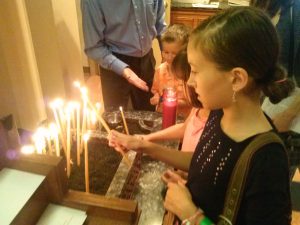Fasting and Feasting
Man does not live on bread alone, but on every word that proceeds from the mouth of God. (From the Tawrah)
By: Georgia Coats
Last month, my husband and I joined our good friends at a beautiful Islamic wedding reception. He went with the men, and I with the women. It was an incredible celebration of dancing, drums, exquisite dresses and incredible cuisine. It was a time to usher in something new and something beautiful—the union of a husband and wife in their new life together. I admired the abundant display of fruit platters and little cakes and cannolis that donned the back table. They were a vision of sweet, delicious things to come. And though I didn’t understand much of the Arabic conversations going on amongst the ladies at my table, I understood the topic of Ramadan on the lips of many. It seemed as though everyone was anticipating this month of fasting and all that it entails.

Growing up in a Greek Orthodox Christian home, my family practiced 40 days of Lent—a vegan diet, abstaining from meat, dairy and other animal products, in anticipation for the celebration of Easter. Easter is the focal point of the Christian calendar. It is a time to celebrate new life, new hope, redemption and forgiveness as we reflect on the path of suffering and victory of Jesus the Messiah. The joy of Easter is intertwined with the fasting that comes before it. As a child, my favorite Easter treat was little chocolate eggs in a colored candy shell. I remember trying to sneak around the kitchen to curb my chocolate craving during Lent, leading up to a grand resurrection celebration. Then, on the Saturday evening before Easter, we would dress in our best celebratory garb and attend worship services long past midnight. All I could think about was arriving home to feast on all the delicacies and choice foods we had abstained from for forty days. How sweet those treats tasted after waiting so long to eat them!
When I lived on my own, away from the community aspect of this Orthodox Lenten practice, I realized quickly that the little chocolate eggs didn’t taste as delectable as they did when I had abstained from them and anticipated them for so long. There is a time for fasting and a time for celebrating. Both are important. Jesus the Messiah used the example of a wedding feast when he described fasting to his followers. He explained that when the bridegroom enters the wedding, this is a time for celebrating. How true it was at the wedding we attended last month. We eagerly anticipated the arrival of the bride and groom. We all abstained from celebrating until they showed up.
Sometimes I fast privately, abstaining from all food and drink, day and night, for a specified amount of time, in order to focus on prayer and listening to God. The growls in my stomach are a reminder to pray. Fasting forces me to depend on God, even before food. After all, Man does not live on bread alone, but on every word that proceeds from the mouth of God. Fasting teaches me to listen more carefully to the words of God. Fasting is both a spiritual discipline and a physical detox. It is a time to rid our bodies of unhealthy toxins and also expose the dark places in our spirits. According to Qur’an scholar Sohaib Saeed of the Bayyinah Institute, “fasting brings to the surface our inner reality.” This is so true. When we are weak, our true nature comes out.
I have studied other languages prior to Arabic, and it never occurred to me before to learn the vocabulary to talk about fasting. But in Arabic, and among my Muslim neighbors, fasting is an important topic of conversation. Living in Dearborn for the last 15 years, I have learned other valuable lessons on fasting. I appreciate the power and joy of fasting in community and breaking fast in community. My family anticipates the month of Ramadan, and not just because we are on the receiving end of the mandate to generously share with one’s neighbors. We, as part of a Muslim community, are impacted greatly by the month of fasting at our kids’ school, at the local places of business, and among friends. During this month, I am grateful to live in a community that pushes me to teach my children about this spiritual discipline at an early age. I love that kids have discussions about fasting on the playground!
Whether fasting is for 30 days, breaking fast each evening, or whether it is for three days and nights straight, or a restricted diet for 40 days, what matters is the spiritual lessons that come from it: to set aside a time to seek God, to embrace our weakness, and to anticipate our breaking of fast, and the sweet celebrating that follows—like when the bride and groom show up to the wedding feast!












